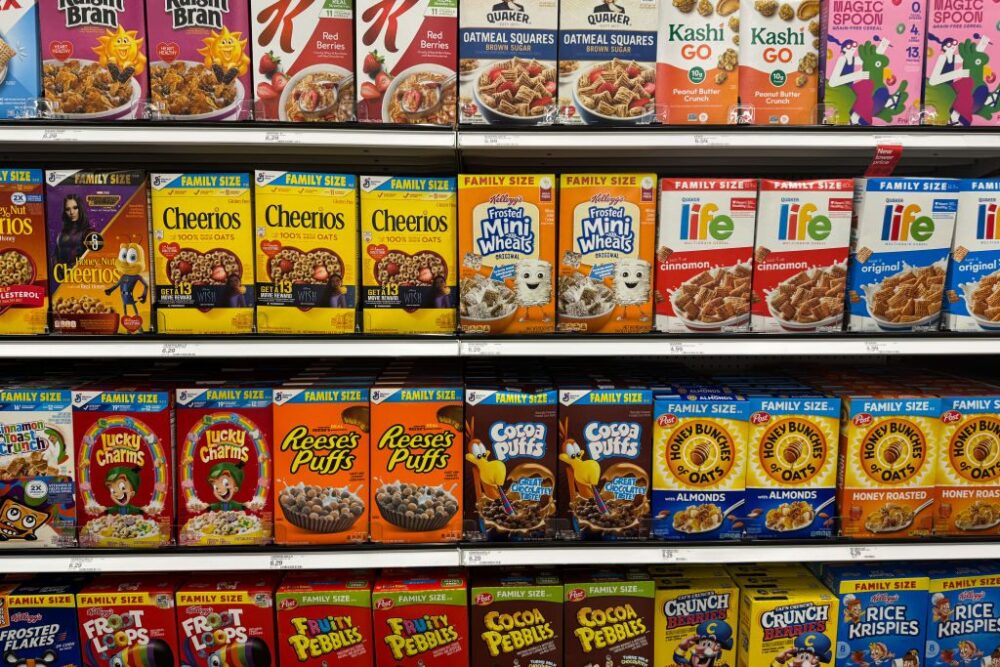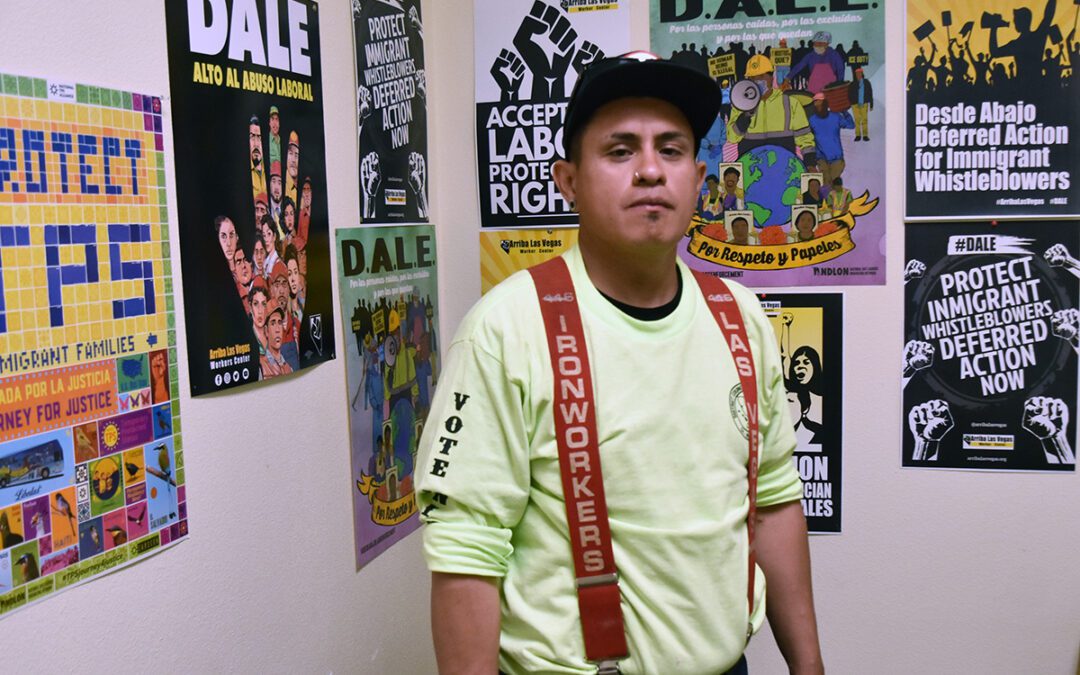
Cereals packaging are seen at the grocery store in Las Vegas, United States on November 17, 2023. (Photo by Jakub Porzycki/NurPhoto via Getty Images)
Grocery and food companies’ massive profits have drawn increased scrutiny from lawmakers, including Nevada Sens. Jacky Rosen and Catherine Cortez Masto.
As inflation drives prices up so high in Nevada that groceries are reportedly more expensive here than in 48 other states, an expert says middle- and working-class Nevadans are bearing the negative effects of the increased costs.
The consumer price index (CPI)—which measures inflation rates experienced by consumers—for the urban areas of the West region of the US hit its highest point ever recorded for all goods this March, the latest reported month. The CPI for Rent and shelter and food and beverages in urban Western areas also reached the highest-ever levels since data for those categories started being reported more than 40 years ago.
Reported fuel costs are also higher than the pre-COVID record in 2012, but have come down from their peak in 2022.
Nevada consumers also currently spend the second most on groceries compared to every other state in the US, according to a report in January from HelpAdvisor that used statistics from the US Census. The average Nevadan household spends just under $295 per week on groceries, over $20 higher than the reported national average of just over $270 and second only to California, where consumers spend an average of just under $298 per week.
This surge in costs comes as large grocery chains in the state like Kroger and Walmart reported billions in profits in each of the last five years, with both earning more last year than in 2019 and 2020. Kroger, which owns 46 stores in Nevada according to its website, reported an operating profit of $3.1 billion on its earnings report last year. Last year’s profits followed a reported operating profit of $4.1 billion in 2022, $3.5 billion in 2021, $2.8 billion in 2020 and $2.3 billion in 2019.
Food and beverage companies also reported significant growths in profits since the start of the pandemic. Forbes reported that PepsiCo saw a 21% increase in profits in the first quarter of 2023, Hershey’s had a 62% increase in profits in 2021, and Tyson Foods’ profits doubled from 2021 to 2022, the company reported.
Nevada’s middle- and working-class bear the brunt of higher costs
Nevadans in the middle and lower economic classes are the ones most feeling the consequences of higher prices, with the poorest people feeling them the hardest, according to Marla Stafford, professor of marketing at UNLV.
Stafford said people in affected income levels have to change their lifestyles to afford the more expensive costs of living, and the amount and magnitude of what changes a person needs to make in their lifestyle depends on what economic class they are in.
“You know, we have to eat, so we’re not going to stop eating, when grocery prices go up,” Stafford said. “Our eating habits will change, what we eat will change, what we put on the table, what we make for dinner.”
She said many people turn to cheaper, often lower quality food options at the grocery store in times of high prices.
One study published in the National Library of Medicine found that costs of healthier food items increased at a greater rate during and immediately after the COVID-19 pandemic than other items deemed less healthy after analyzing grocery prices in Australia from 2019 to 2022. Another study published in 2022 by Science Advances found that a major reason that fruits and vegetables are under consumed in the US is due to high prices, finding that fruits and vegetables “are 40% more expensive than is efficient” for a healthy diet.
Stafford said people affected by rising prices also often limit their utility use, like turning off their air conditioning when they’re not home or at night, or keeping their homes at higher temperatures than usual.
Nevada lawmakers call out corporate profits and proposed mergers
Grocery and food companies’ profits have drawn increased scrutiny from lawmakers, including Nevada Sen. Catherine Cortez Masto, who wrote to members of the Federal Trade Commission (FTC) and Department of Agriculture in February of last year urging them to investigate unfair egg prices and to bolster oversight efforts to regulate volatile egg costs.
Sen. Jacky Rosen also called on the FTC to block a proposed merger between Kroger and Albertsons, which she argued would further raise grocery prices and monopolize the supermarket sector.
The FTC announced in February it had filed a lawsuit against Kroger and Albertsons, challenging the merger. The Office of Nevada Attorney General Aaron Ford also joined the lawsuit, alongside the attorneys general of seven other states and Washington D.C.
Rosen also cosigned onto The Shrinkflation Prevention Act of 2024, a bill seeking to end the predatory process of companies decreasing product sizes while charging the same price.
How did we get here?
The recent surge in inflation started when the COVID-19 pandemic disrupted supply chains by slowing production of products and making many common items less available than normal, which drove up prices. The FTC published a report in March that analyzed the actions of grocery retailers, wholesalers, and suppliers during the pandemic.
The agency found that limited competition in product markets can create or make supply chain bottlenecks more extreme. Those bottlenecks make supply chains more vulnerable to major shocks, like a global pandemic, and that vulnerability allows major firms in the markets to seize more control and hurt competition. The FTC concluded that companies, often larger ones, threatened suppliers for access to scarce products during the pandemic.
The agency also said that concentrated markets, or markets largely owned by fewer companies, contributed to the sustained inflation because “the pandemic revealed that concentration can undermine market resiliency and create market fragility.” The commission suggested that fragile, concentrated markets need policy intervention or large firms may consolidate them even further.
The commission also noted the sustained high profits of grocery retailers, and suggested that the FTC and lawmakers investigate the elevated profits.
The Groundwork Collaborative, a progressive organization that conducts economic research, also published a report looking at the role of corporate profits in relation to high prices. The report said “corporate profits drove 53 percent of inflation during the second and third quarters of 2023,” even as labor costs and nonlabor inputs that drove inflation early in the pandemic eased in recent years.
Nicholas Irwin, associate professor of economics at UNLV, and Brent Hathaway, business professor at UNLV, both agreed that corporate pursuit of short-term profits during and immediately following the pandemic contributed to the inflation that we still see today.
“Opportunism and short-sighted greed can and does happen under conditions of uncertainty,” Hathaway wrote in an email.
But the two UNLV professors also each said there are other contributing factors to today’s inflation.
Hathaway said rising energy prices contributed to higher costs, while both he and Irwin said federal, pandemic-era stimulus programs also played a role by boosting demand while supply chains struggled to recover from the pandemic’s disruptions.
Irwin said the federal solution is to raise interest rates to discourage people from spending—as the Federal Reserve has done over the past two years—but argued the amount of money still in the economy has kept everyday spending from going down so inflation is still an issue today.
Ultimately, the consequences of those higher costs are being borne by the most vulnerable Nevadans, who are having to change their spending habits to get by, Stafford said.
“There are a lot of Nevadans that are struggling just to make ends meet, and they don’t have the money to sustain,” she said. “They’re going to put their money into their fundamental needs, so it is going to change their lifestyles.”

Apprenticeship programs are helping Nevadans launch their careers
The number of registered apprentices in Nevada has more than doubled over the past decade and a recent surge of funding from the Biden...

El Día Internacional de los Trabajadores fue dedicado a los varilleros
Este año, Arriba Las Vegas Worker Center conmemoró el Día Internacional del Trabajador con una caravana de acciones en las que destacaron...

Biden makes 4 million more workers eligible for overtime pay
The Biden administration announced a new rule Tuesday to expand overtime pay for around 4 million lower-paid salaried employees nationwide. The...

Biden administration bans noncompete clauses for workers
The Federal Trade Commission (FTC) voted on Tuesday to ban noncompete agreements—those pesky clauses that employers often force their workers to...

Sens. Jacky Rosen and Catherine Cortez Masto join efforts against Big Oil consolidation
The senators point to the recent consolidation of Big Oil companies as potential violations of antitrust law, imploring the Federal Trade Commission...

After a push from Sen. Jacky Rosen, the FTC is suing to block the Kroger-Albertsons merger
“My constituents lack assurances that the proposed deal will not further increase food costs for hardworking Nevadans who are already getting...




